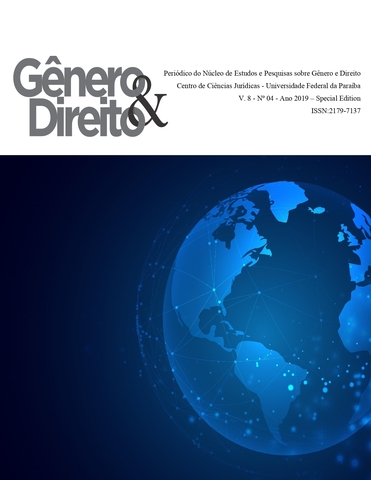LANGUAGE OF FAMILY COMMUNICATION IN THE MODERN TATAR-RUSSIAN BILINGVAL SOCIETY
DOI:
https://doi.org/10.22478/ufpb.2179-7137.2019v8n4.48423Palavras-chave:
bilingualism, sociolinguistics, family, language of family communication, Tatar languageResumo
The article is devoted to the study of the functional potential and specificity of use of native language in family communication, in the conditions of modern Tatar-Russian bilingualism. The sociolinguistic study was conducted on the basis of a survey of humanities students, taking into account the type of family, place of residence and language of instruction at school. The choice of respondents of this category is explained by the fact, that they are sufficiently dynamic and receptive to new socio-cultural and political conditions. They were brought up in the conditions of intensification of bilingualism development on the one hand, and the activation of national identity on the other. The analysis shows, that in the modern active bilingual society the language of family communication has its own specificity and vary, depending on the place of residence and the type of family. The rural family, predominantly, uses its native language in domestic communication. In a rural family, children speak their mother tongue with their parents and brothers and sisters. The urban family, living in the environment of Russian-Tatar bilingualism, prefers to use both languages. Outside the family society, respondents actively use Russian language. The survey shows, that the degree of functioning of native language in urban families between children and their parents is higher, than between close relatives. The penetration of bilingualism into the family environment is also observed in modern families, implementing Tatar-Russian bilingualism. Native Tatar language is the first for the members of such families.Downloads
Referências
Bayramova L.K. Tatarstan: language symmetry and asymmetry. - Kazan: Publishing House of Kazan University, 2001. - 267 p.
Esin O., Gorobets E., Galiullin K., Kulsharipova R. The Description of Pain by Bilingual Patients with Neurological Disorders: a Linguistic Study // SGEM Conference on Psychology & Psychiatry, Sociology & Healthcare, Education: Conference Proceedings (Bulgaria, International Multidisciplinary Scientific Conferences on Social Sciences and Arts, 3-9 September 2014). – 2014. – V.1. – Pp. 449-456.
Shakirova G.R., Kharisova C.M., Kharisov F.F. Methodical Support of Teaching of Parts of Speech in Teaching of the Native Language // Modern Journal of Language Teaching Methods. Special Issue (December 2016). – 2016, Vol., ISSN: 2251-6204. – Pp.155-160.
Ismagilova A.M., Galiullina G.R., Kuzmina Kh. Kh. Functional potential of mother tongue in conditions of bilingualism among youth of the Republic of Tatarstan // Modern Journal of Language Teaching Methods. Special Issue (December 2016). – Рр. 66-70.
Maximova O., Belyaev V., Laukart-Gorbacheva O. Transformation of the system of bilingual education in the Republic of Tatarstan: Crossover ethnolinguistic controversies // Journal of Social Studies Education Research. – 2017. – Vol.8, Is.2. – Pp.15-38.
Nizamova L. Ethnic Tatars in Contention for Recognition and Autonomy: Bilingualism and Pluri-Cultural Education Policies in Tatarstan, in Nationalities Papers. The Journal of Nationalism and Ethnicity. 2016. Vol. 44. №1. Pp. 71-91.
Solnyshkina M.I., Ismagilova A.R. (2015). Linguistic landscape westernization and globalization: The case of Kazan, Republic of Tatarstan. XLinguae, 8(2), 36-53.
Zamaletdinov R.R., Yusupov F.Y., Karabulatova I.S., Yusupov А.F., Husnutdinov D.H. The formation of Tatars ethnic groups in the Southern Urals and Trans Urals region // Life Science Journal, 2014. – № 11(11S). – Pp. 214-217.
Galiullina G.R., Ildarkhanova F.A. Ethnocultural values of modern families of the Republic of Tatarstan // Bulletin of Kazan Technological University. - 2012. - Vol.15, №1. - Pp. 203-207.
Iskhakova Z.A. Ethno-linguistic issues in modern inter-ethnic families of Tatarstan / TATARICA. – 2015. №2 (5). – Рр. 7-14.
Titova T.A. Ethnic minorities in Tatarstan: status, identity, culture. - Kazan: KSU, 2007. – 254 p.
Dictionary of sociolinguistic terms / V.A. Kozhemyakina, N.G. Kolesnik, Т.B. Kryuchkova and others; executive editor V.Yu. Mikhalchenko. The Institute of Linguistics, Russian Academy of Sciences. - Moscow: 2006. - 312 p

